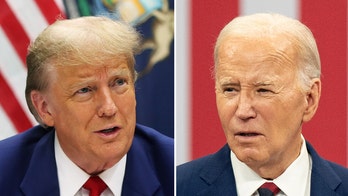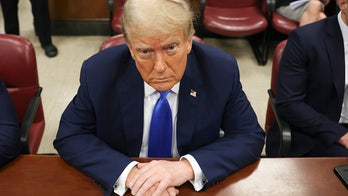Two of President Obama's Cabinet members authored a variety of earmarks in the $410 billion omnibus spending bill the House is poised to pass Wednesday to keep the government running through Oct. 1.
Transportation Secretary Ray LaHood and Labor Secretary Hilda Solis were both House members when appropriators began to forge this legislation last year. However, a stalemate between President Bush and congressional Democrats forced the sides to punt the rest of the spending provisions until now.
New transparency rules ordered up by Democrats two years ago require lawmakers requesting earmarks to write a letter expressly asking Congress to dedicate money for a given project. And as one scours the omnibus spending bill, it's easy to find specific appeals from people who are no longer in office, like LaHood and Solis.
In LaHood's case, the former Republican Illinois congressman wrote a March 19, 2008, letter asking Congress set aside funding to move the "Jacksonville bandstand" from one of the House office buildings to the National Museum of American History in Washington. LaHood also earmarked funds for police radio upgrades, agriculture research and equipment at a planetarium in Peoria, Ill.
As a Democratic congresswoman from suburban Los Angeles, Solis asked for the federal government to cover the cost of police equipment in Covina, Monterey Park and Baldwin Park, Calif.
As Cabinet secretaries, LaHood and Solis will continue to have significant sway over Washington policy decisions. But because the omnibus bill is a holdover from last year, dozens of lawmakers who either retired or lost re-election are still legislating from the political grave.
After surviving a tight race in 2006, Rep. Deborah Pryce, R-Ohio, decided not to seek re-election in 2008. But the House Wednesday will approve Pryce's request to fund after school programs at the YWCA. Former Rep. Nancy Boyda, D-Kan., was one of the most-vulnerable freshman Democrats to win a House seat in 2006. She didn't survive a 2008 challenge from Republican Rep. Lynn Jenkins. But Boyda's earmark to "identify and trace food-borne zoonotic diseases" lives on.
Former Rep. Tom Allen failed to unseat Sen. Susan Collins, R-Maine last fall. Still, Allen earmarked money for "Lowbush Wild Blueberry Research" and potato cloning programs at the University of Maine.
Even former "non-members" penned pet projects into the bill.
These days, Luis Fortuno is the governor of Puerto Rico. But on June 11, 2008, as the territory's resident commissioner to Congress, Fortuno requested funding for "Tropical Subtropical Agricultural Research" at the College of Agricultural Science in Mayaguez, Puerto Rico.
Congressional Scholar Tom Mann of the Brookings Institution cautions that some of these earmarks are merely extensions of existing programs. Mann noted that earmarks authored by former members of Congress may have merit. But Mann concedes that doing last year's bill in February 2009 enables these former legislators to continue to wield power long after they've left office.
"It sounds bizarre that there are earmarks by members who are no longer in Congress," Mann said. "There are historical legacies to actions taken by politicians."
But Mann has questions for House appropriators who authored the bill and allowed the old spending requests to linger.
"Did they feel they were bound by these earmarks? Were they scrubbed by the staff?" he asked.
Jennifer Hing, a spokeswoman for Rep. Jerry Lewis, R-Calif., the ranking Republican on the Appropriations Committee, tried to lay the blame at the feet of House Democrats.
"One of the many problems with not doing the annual budget work on time and within the regular process is that members of Congress are forced to vote on the priorities of their predecessors," said Hing.
But congressional Democrats argue it was the intransigence of President George W. Bush that prevented them from completing the bill while the ex-lawmakers were still in office.
A Democratic House aide defended the decision to maintain earmarks requested by former lawmakers in the bill.
"We aren't going to punish local communities just because their member didn't return this year," said the aide.
Still, others wonder if it's appropriate for the ghosts of former lawmakers to continue to have power.
One congressional aide who requested anonymity asked whether the lawmakers who replaced the old members would advocate the same earmarks.
"Their legislative priorities might be different. Those members were lobbied and decided to write that earmark. And now we're going to leave it in even though (the former member) isn't here any more?" the aide asked.
Mann said that decision is ultimately up to the House Appropriations Committee, the panel that decides how the government spends its money.
"The appropriations committee has authority over this bill. The appropriations committee decided to put (these earmarks) in," he said.
Many regard earmarking as a way for lawmakers to ingratiate themselves with voters back home. But that didn't necessarily make a difference in the race of former Rep. Rep. Don Cazayoux, D-La.
Cazayoux won his congressional seat in a special election in May 2008 but lost it in November. Still, the phantasms of Cazayoux's earmarks for flood control projects in Baton Rouge haunt this bill.
Mann contends it's a fallacy that earmarks win political favor back home.
"Tough luck for them," said Mann of lawmakers who earmarked and lost. "Delivering the bacon is overrated."
FOX News' Mosheh Oinounou contributed to this report.




